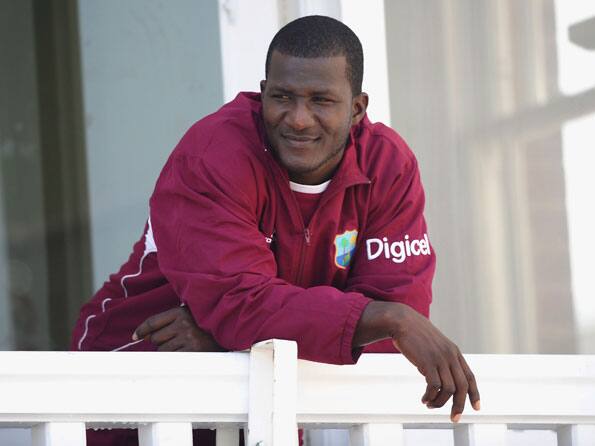West Indies can’t hope for succour against England in Robin Hood county

No matter what rankings may suggest, Darren Sammy will be hoping that it is his men that make merry © Getty Images
By Rohan Kallicharan
Nottingham has many things for which it is well known. Robin Hood and Nottingham Forest are just two that readily come to mind, the latter in reference to the football team and not the patch of woodland to the North of the city in which the former was known to operate.
It is probably lesser known as the final bastion of Caribbean invincibility in England. “Caribbean what” I hear you say? Admittedly, the notion of West Indian dominance is alien to any cricket aficionado under the age of 20. Over a period of 12 years, encompassing four tours, the West Indies have won a solitary Test in 15 against England in England, losing 12. This not including last week’s defeat at Lord’s.
However, for reasons best known to those who schedule Test match cricket in the UK, the large West Indian community in Nottingham has been precluded from seeing the tourists in a Test since 1995, a high-scoring contest drawn after a late rearguard action from the home side, and remembered for a scintillating century from a certain Brian Lara, enjoying a vintage summer.
Historically, Trent Bridge was the opening Test match of one tour summer, and tended to be a ground on which England prospered in the early part of the summer. Whilst there is a myth that Trent Bridge only became a swing bowler’s paradise after the building of the new stand at the Radcliffe Road End, I suspect that those, who were tormented for years not only by Richard Hadlee, but by much less stellar names in county cricket, would beg to differ.
As such, touring sides were often caught, figuratively speaking, with their jockstraps down as they arrived in Nottingham less than prepared for such conditions.
The West Indies were, of course, a different kettle of fish altogether. Andy Roberts and Joel Garner took 15 wickets between them in 1980, Malcolm Marshall took six English first innings wickets in 1988, the start of a summer in which the great Bajan was unplayable for long period. In 1991, Curtly Ambrose was the destroyer-in-chief.
It was not the bowlers alone who thrived in the East Midlands. The great Sir Vivian Richards had a reasonable record at Trent Bridge … 232 and 63 in 1976, which included a then record 3rd wicket partnership of 303 with a certain Alvin Kallicharran. Not content with that, he made 64 and 48 in a relatively low scoring match in 1980, and identical scores of 80 in 1988 and 1991 a total of 567 at Trent Bridge at average of 94.5. A perfect reflection of the swing bowler’s paradise!
As with Edgbaston and The Oval in particular, it was a ground on which West Indian supporters sang and danced with pride, expressing themselves with pride against the backdrop of a society in which many still felt marginalised. If that social class has proportionally levelled itself out, then, sadly for many, too has West Indian cricket conversely.
The open areas of grass beyond the boundary ropes, where they once created a hitherto unseen party, are now the front rows of new concrete stands – not soulless as with so many football stadia, but certainly unable to convey the joy that we once saw. Maybe for fans of the West Indies, that is no bad thing, for there has been so little to cheer in recent years.
The West Indies, after putting up staunch resistance at Lord’s last week, reach a ground on which this modern English side has thrived. The bounce and a little bit of pace, nothing express, gives batsmen full value for their shots, and swing bowlers have thrived from Matthew Hoggard and Andrew Flintoff in 2005 through to James Anderson, Stuart Broad and Tim Bresnan in 2011 against India.
It is that trio that will pose the biggest threat to the West Indies’ unbeaten record at Trent Bridge. Whilst I fully expect the West Indies to again be competitive, and the tourist’s pace attack to cause England problems of their own, it is difficult to make a case for anything other than an England victory.
However, supporters of the West Indies, me included, will hope that they can draw on the ghosts of past glories in this famous Nottingham suburb. The rankings may suggest that England are the new sheriffs in town, but Darren Sammy will be hoping that it is his men that make merry.
(Rohan Kallicharan, son of the legendary batsman Alvin Kallicharan, is West Indian cricket enthusiast based in the UK who played at under-19 level. He is now a Recruitment Professional who writes about the game in his free time. He is a columnist for All Out Cricket Magazine. He also has own sports’ blog http://hetoreahamstring.co.uk)